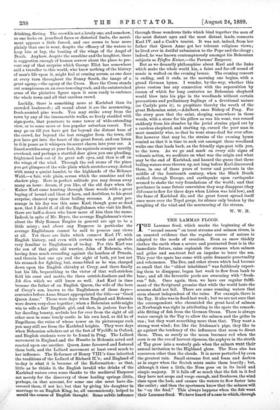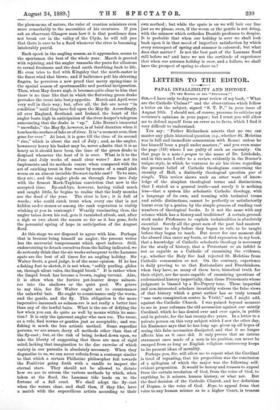THE L A MM A S FLOOD. T HE Lammas flood,
which marks the beginning of the " second season" on trout streams and salmon rivers, is an unnoted evidence that the regular course of nature is adapted to the needs of creation. Even as snow thickly clothes the earth when a severe and protracted frost is in the immediate future, rains replenish the streams when salmon and grilse and sea-trout feel an impulse to leave the sea. This year the spate has come with quite dramatic punctuality and vehemence. The Dee, and other rivers which had become so small that the " oldest inhabitant" was faithlessly expect- ing them to disappear, began last week to flow from bank to brae; and all the favourite pools are swarming with "fresh- run " fish. Once again, then, we have our regular fulfil- ment of the Scriptural promise that while the world lasts the seasons shall not fail. There are some running waters that seem almost independent of the rains. For example, there is the Tay. It also was in flood last week ; but we are not sure that the correspondent who chronicled the great haul of salmon at Newburgh was right in attributing to the spate the remark- able flitting of fish from the German Ocean. There is always water enough in the Tay to allow the salmon and the grilse to run ; but they want something more than that. They want a strong west wind ; for, like the Irishman's pigs, they like to go against the tendency of the influences that seem to direct them. Thus, as surely as the moon becomes red when the corn is on the eve of harvest ripeness, the zephyrs in the strath of Tay grow into a westerly gale when the salmon want their annual invitation to the Highland glens. The Ness also has resources other than the clouds. It is never perturbed by even the greatest rain. Small streams fret and foam and darken as in anger when the Scotch mists smite them heavily ; but, although it rises a little, the Ness goes on in its lucid and simple majesty. If it falls off so much that the fish in it fee/ they have not scope and verge enough, and freshness, the wind rises upon the loch, and causes the waters to flow faster into the outlet ; and then the sportsmen know that the salmon will be " on the feed." This always happens when the fish want their Lammas flood. We have heard of a case in which, through the phenomena of nature, the ruler of creation ministers even more remarkably to the necessities of his creatures. If you ask an observant Glasgow man how it is that pestilence does not break out in the valley of the Clyde, he will tell you that there is sure to be a flood whenever the river is becoming intolerably putrid.
Each epoch in the angling season, as it approaches, seems to the sportsman the best of the whole year. March is greeted with rejoicing, and the angler ransacks the poets for allusions to vernal freshness and the dead earth throbbing back to life. He even tries to feel with Kingsley that the north-easter is the finest wind that blows ; and if hailstones pelt his shivering fingers, he perceives a new proof that merry spring-time is the special season of sportsmanlike and poetical invigoration. Then, when May draws nigh, it becomes quite clear to him that there is no time like that in which the fluttering green drake provokes the trout into lusty appetite. March and April were very well in their way ; but, after all, the fish are never " in condition " until they have fed upon the May fly. Accordingly, all over England, Scotland, and Ireland, the heart of the angler beats high in anticipation of the river-keeper's telegram announcing that the drake is "up." Like Burns's immortal " snowflake," the May fly, however, is of brief duration when it touches the surface of lake or of river. It is "a moment seen, then gone for ever." At least, it is gone till the time of its second " rise," which is about the end of July ; and, as the angler, howsoever heavy his basket may be, never admits that it is as heavy as it should have been, the time of the green drake is despised whenever the heat of it is over. What is it to the June and July weeks of small clear water Are not its implements and its methods coarse when compared with the art of catching trout in fine water by means of a small pink worm on an almost invisible Stewart-tackle cast ? To be sure, they are ; and the angler plods on through June into July with the firmest Mark-Tapleian conviction that now is the accepted time. By-and-bye, however, having toiled much and caught little, he begins to realise that the leafy months are the dead o' the year. The river is low ; it is full of weeds ; who could catch trout when every one that is not hidden under stones or among the rank vegetation is visibly winking at you in contempt ? Wearily ruminating thus, the angler takes down his rod, gets it varnished afresh, and, after a sigh or two about the season so far as it has gone, feels the perennial spring of hope in anticipation of the August flood.
At this stage we are disposed to agree with him. Perhaps that is because being himself an angler, the present writer has the mercurial temperament which sport induces. Still, endeavouring to detach ourselves from the failing indicated, we do seriously think that the six weeks subsequent to the Lammas spate are the best of all times for an angling holiday. Sir Walter Scott, a good judge, is of the same opinion. If he has a fishing feat to sketch, it is not when, " softly purling, glides on, through silent vales, the limpid brook." It is rather when the limpid brook has become a brown, raging torrent. Also, it is often when the furtive pot-hunter drops salmon- roe into the shallows or the quiet pool. We grieve to say this, for Sir Walter ought not to countenance the unlawful bait. He ought to countenance only the worm, and the gentle, and the fly. This obligation is the more imperative inasmuch as salmon-roe is not really a better lure than any of the lawful baits. What is the use of defying the law when you can do quite as well by means within its sanc- tion? It is only the ignorant angler who uses roe. The trout, as a role, find worms or gentles just as acceptable; and roe- fishing is much the less artistic method. Some superfine persons, we are aware, decry all methods other than that of the fly-cast ; but, at the risk of being looked down upon, we take the liberty of suggesting that those are men of rigid mind, lacking that imagination to the due exercise of which variety in our pursuits is absolutely necessary. When they dogmatise to us, we can never refrain from a contempt similar to that which a certain Philistine philosopher felt towards the Positivist going forth with a candle to inspect the eternal stars. They should not be allowed to dictate how we are to esteem the various methods by which, when taken at the flood, the Lammas tide leads on to the fortune of a full creel. We shall adopt the fly-cast when the waters clear, and shall then, if they like, have a match with the supercilious artists according to their
own method ; but while the spate is on we will bait our line just as we please, even, if the worm or the gentle is not doing, with the minnow which orthodox Deeside professes to despise. It is probable that when our holiday is over we shall look back upon it in that mood of imperfect satisfaction by which every retrospect of spring and summer is coloured; but what does that matter P Is not the best part of the Lammas flood still before us P and have we not the certitude of experience that when our autumn holiday is over, and a failure, we shall have the prospect of spring to cheer us?



































 Previous page
Previous page